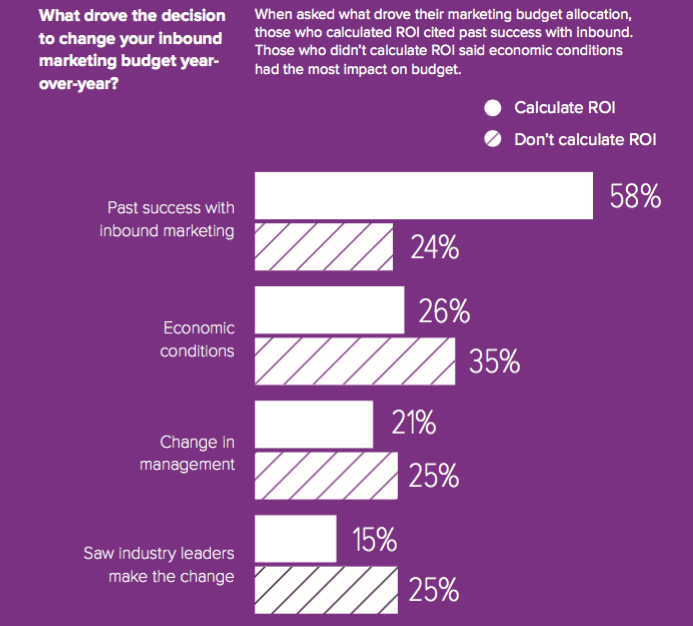We've been reporting on key insights from HubSpot's 2016 State of Inbound. To catch up, give our first and second State of Inbound blogs a read.
Or, read below and work you way back in time—yes, we just offered you the chance to time travel...we're that good. The choice is yours.
In this, our final State of Inbound transmission, we'll take a look at the connection between demonstrable ROI and securing increased marketing funding.
State of Inbound's data suggests that organizations that track results and can demonstrate marketing success are 1.6 times as likely to receive higher budgets.
Let's take a look at why that might be.
Tracking Results is a Critical First Step
Anecdotal evidence does not cut it.
Thinking a marketing tactic is producing and knowing it indisputably are two utterly different things.
Only the latter will turn marketing skeptics into believers ready to open up the purse strings.
We've discussed in our prior blog posts about the importance of intentional, programmatic marketing. Intentional marketing is systematic, consistent and strategy driven, whereas accidental marketing is haphazard, reactionary and/or purely tactical.
Once you've taken the important step to develop a legitimate intentional marketing program, you need to take another critical step: establishing systems to track your results.
Whether this is just an excel spreadsheet or a more robust tracking system like HubSpot, tracking results and return-on-investment is mission critical for the following reasons:
- Measurement enables rapid market adjustments.
Once you can track marketing results, you'll quickly be able to monitor and adjust your strategy and corresponding tactics. Anecdotal evidence, i.e. staff saying something seems to be working, won't cut it and gives you no substance for analytical assessment and no rationale for change. - Accurate reporting maximizes spending impact.
If you have a reporting system tracking results across a wide range of important metrics, you can redirect your spending allocation to capitalize on what's working and stem the bleeding where it's not. - If Q1 radio ads fail to generate leads, yet paid digital advertising has been yielding strong results, reducing radio and increasing paid digital spend in targeted areas could amplify returns
- If organic website traffic from blogs and content marketing is knocking it out of the park, scaling back paid advertising and diverting or saving these budget dollars could be a huge win for you, your team and your business
However, without accurate tracking and clearly quantifiable data, you'll continue to pour precious marketing resources into vehicles that don't produce to the detriment of those that do.
Building the Case for Marketing
If you control your marketing budget, you need evidence.
If you don't, you need evidence.
Building the case for increased marketing budgets begins and ends with demonstrating success through data tracking.
There is no way to avoid proving your marketing strategy's value: You'll either need to justify marketing expenditures to yourself, to your supervisor or to a board of directors. And to justify budget increases, and manage up if necessary, you'll need to be able to persuasively demonstrate marketing successes and ROI.
State of Inbound gathered the following data from organizations that did and did not track marketing ROI. Here's what they discovered:

- For those that calculate ROI, 58% of respondents indicated past marketing success led to marketing budget changes
- For those that did not calculate ROI, the biggest driver of marketing budget changes were economic conditions at 35% of respondents
- For those that did not calculate ROI, budget changes were driven by management changes and the influence of industry leaders at a higher percentage than those that tracked ROI
State of Inbound's data clearly illustrates that tracking results and ROI tends to lead to more direct internal control over marketing spend. If success is demonstrated and proven, there can be thoughtful justification for increased marketing spend as a counter argument to budget cuts driven by an unpredictable economy or the capricious nature of industry trends or management changes.
Let's keep it real, though.
If the economy is struggling, or a given businesses industry financials are suffering, it makes the case for increased marketing budgets far more difficult.
Shifting industry marketing trends could do the same, but will be a second-tier threat to marketing budget increases.
That said, without effective ROI tracking and the ability to demonstrate marketing success via data-driven evidence, outside negative forces will always drive marketing spending decisions since you will not be able to make a strong case against what's beyond your sphere of influence.
You can control tracking marketing results.
You can't control the impact of the 2016 election on the economy or if and when the Federal Reseave raises rates.
If you focus on what you can impact you can increase your ability to direct change.
Being able to show where marketing dollars work, where they don't and how they can be leveraged most efficiently to generate new business is even more critical during times of economic volatility or political uncertainty.
Being able to show your successes and demonstrate marketing ROI will not only improve your marketing programs results, it will also empower you to prove to the powers that be that your marketing strategy justifies investment even in the face of unpredictable external events.
Nearly two times as as likely to receive higher marketing budgets...Sounds pretty good right?
Start tracking. Now.
If you don't know where to start, it doesn't hurt to ask. We're here to help and we have the scalable tracking system you need right here, waiting to help you build and win the case for stronger marketing investment.
